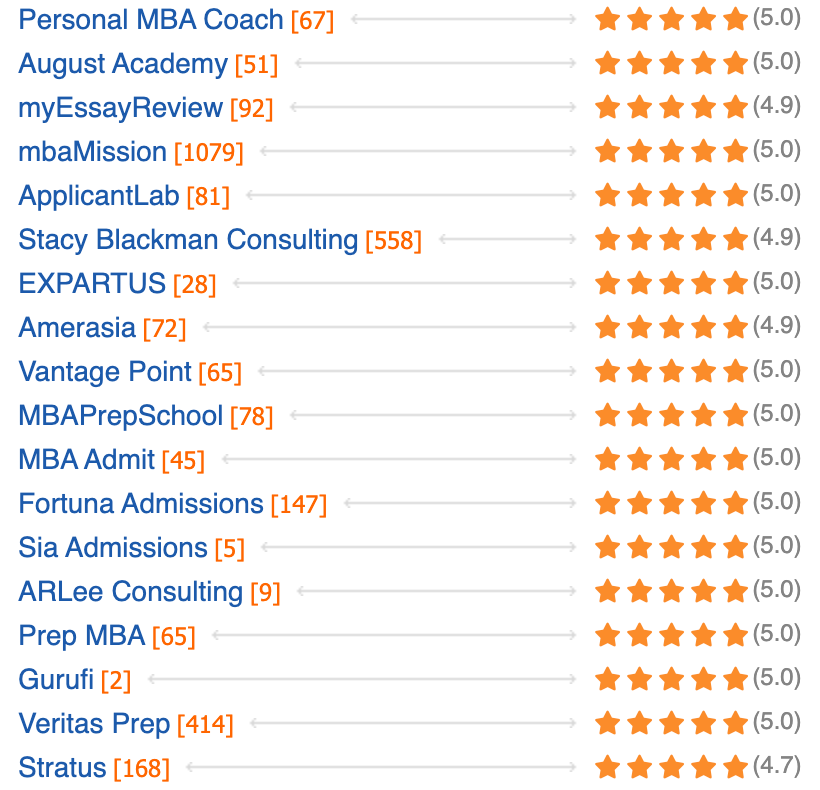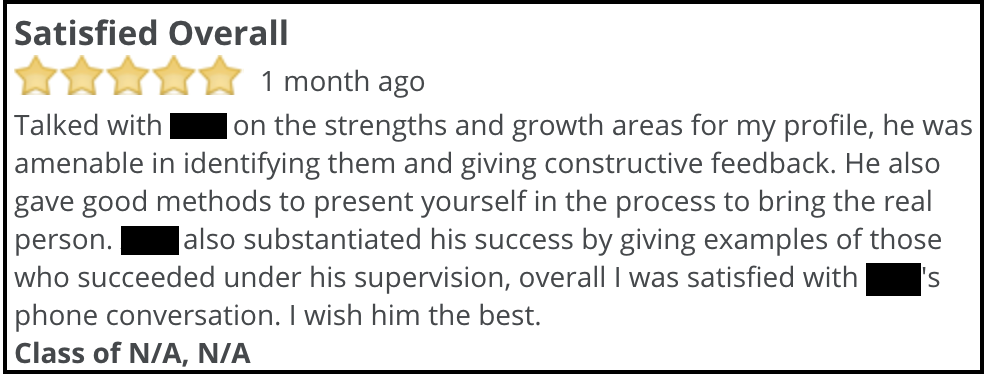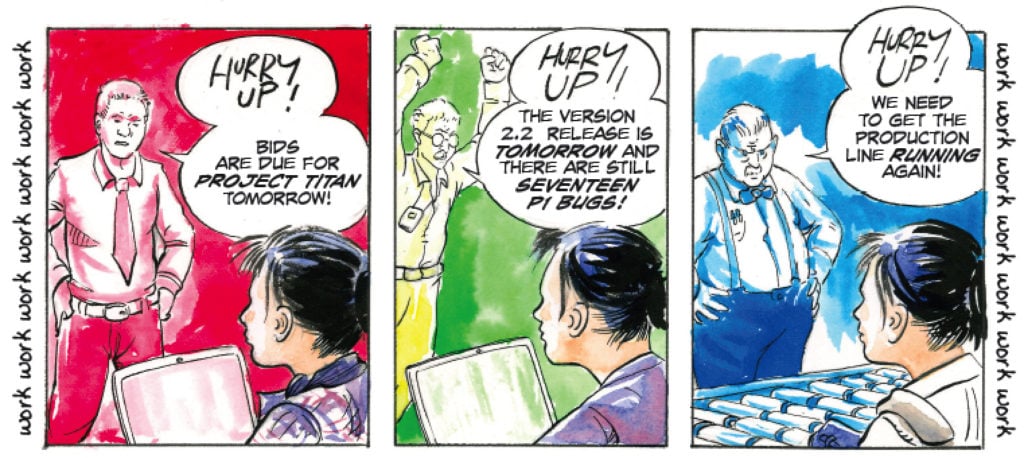
This article lays out the “dirty secrets” of admissions consulting, and gives some tips about how and why you should take a holistic approach during your selection process of hiring an MBA admissions consultant.
When you began your search to hire an MBA admissions consultant, the first dilemma you probably encountered was that every admissions consulting firm across the world seemed to have identical 5-star ratings. Will the real Slim Shady please stand up? We’re gonna have a problem here…

Reviews like the GMAT Club ones shown above do have their uses, in the sense that reading them carefully can sometimes produce insights. But did you realize that:

For the full story on reviews, see our article MBA Admissions Consulting Reviews: Are They Real?. TL;DR: you can’t rely exclusively on reviews.
And these reviews, with their issues, are the basis for the MBA admissions consultant rankings you’ll see online.
To provide more transparency, we offer video case studies and reviews with real former clients at Menlo Coaching reviews. But that’s not the point of this article, which is meant to educate you generally about the MBA admissions consulting industry.
This means if you want to find an admissions consultant who will give you a real advantage in the MBA admissions process, you have to dig deeper and learn about how MBA admissions consulting firms differ. Because if the consultant you hire is the same as everyone else’s consultant… you can’t expect distinctive results.
At Menlo Coaching, we do things differently, which we’ll get to later, but two common models dominate the industry— hiring graduates of top MBA programs, and hiring former admissions officers. This leads us into the next big secrets.
Many MBA admissions consulting firms are founded by graduates of MBA programs, who go on to hire other graduates of top MBA programs. It sounds logical, but is based on a huge assumption that could be summarized as:
I have an MBA, therefore I am an expert in MBA admissions.
Think of it this way. If you’re reading this article, you almost certainly have a college degree. Are you an expert college admissions counselor? Of course not. Just because a person attended an MBA program does not mean that they have a great talent for creating MBA applications. People are admitted to business schools for many reasons beyond the quality of their applications, including:
These factors may have helped your consultant back when they were applying, but your consultant’s amazing background won’t do anything to help you win admission.
To avoid this false assumption, at Menlo Coaching we hire coaches for their experience in developing others, telling captivating stories, and helping others to write clearly and concisely. Those are things that will help you win admission to your target business schools.
And besides the fact that an MBA is not a reliable signal of being a great MBA admissions consultant, even from a top MBA program, you also have to wonder…
Is MBA admissions consulting a desirable post-MBA career?
Let’s put it this way. Since 2007, we have never met an applicant whose post-MBA career goal was to become an MBA admissions consultant. MBA graduates expect high compensation. Because attending a top business school costs $150,000 in tuition, $50,000 in living expenses, and two years of lost earnings, this is only fair. Let’s be generous and assume that your consultant isn’t motivated only by money. They’re happy to accept $160,000 as an annual salary. (I know some consultants making $200,000.) Then you have to ask: what does it take to make $160,000 as an MBA admissions consultant? In order to understand that, we have to first see how much MBA admissions consulting services cost.
Let’s take a look at some common pricing structures from firms in the industry.
In an article we wrote about MBA admissions consultants and pricing, we highlight common pricing structures as well as what you will get out of those various service models. Here is a quick breakdown:
Most MBA admissions consultants work on a part-time, freelance basis, splitting revenues 50/50 with the company. So, while you might pay $8,000 when you buy a three-school package, your consultant is only taking home $4,000. This means that your consultant needs to take on >40 clients per year to make their target income. That is simply too many clients to give you the attention you need. For those of you who have never coached MBA applicants… trust us, 40 clients is a LOT, even for an experienced consultant.
By comparison, at Menlo Coaching, we target 20 clients per coach, per year, because we know that having enough time for you is an important part of helping you get your offer. We make the numbers work by:
We still have to charge higher than average prices to maintain our low ratio of clients to coaches, and we don’t apologize for this because we know that this low ratio delivers above average results to our clients. The financial rewards of a great application in terms of getting you into a better business school (with higher post-MBA earnings) or getting you a bigger scholarship are an order of magnitude larger than this difference in prices.
Also— back to the other firms, even with a super-high client load, admissions consulting is far from being the most lucrative post-MBA job in town. Which brings us to the real question…
Why do MBA graduates become MBA admissions consultants?
In short, because they want the flexibility to balance admissions consulting with other commitments, like bootstrapping a startup, or even a full-time corporate job. So do you think your applications will really be the #1 priority for such a consultant?
Some firms proudly market their “full-time” consultants, but you might find that they define this differently than you do. For example, we met one “full-time MBA admissions consultant” who also held a Director-level role at a media agency, another who was running a family office that invested in real estate, and another who was a manager at a well-known consulting firm.
At Menlo Coaching, we actually work full-time, year-round in the same physical office (with a few exceptions— when we relocated, we didn’t fire the staff who couldn’t move with us), and we welcome you to visit us and work with us in person. We do it this way because coaches who choose MBA admissions consulting as a career, not a side hustle, work harder and do a better job.
Hiring former admissions officers is the primary alternative to hiring MBA graduates, and firms that go this way often promise that their consultants have “insider secrets”. But is the hard part of MBA admissions knowing what a great application looks like, or is it knowing how to create one?
The experience of reviewing applications just doesn’t do much to train you to create great applications. To put it another way, if you wanted to cook a great steak, would you ask a restaurant critic or a chef?

Creating a great application from scratch is totally different from judging the quality of an already finished application. Some admissions officers may have the fundamental skills to become good admissions consultants, but it’s not because they have “insider secrets from MBA admissions gatekeepers”.
As Pascal Michels, former Admissions Director at IESE (and now a coach at Menlo Coaching) told us in an interview, what admissions officers want is simple: students who can handle the coursework, get a great job, and help their classmates along the way.
As an MBA applicant, what matters to you is finding someone with the experience to help you convincingly demonstrate these qualities throughout your MBA application.
Some firms make a big deal about matching you with a consultant who “fits” your profile, but the importance of “fit” pales in comparison to the importance of quality. Here’s why you should (mostly) ignore the usual theories of “fit”:
Susan Went to Your Target School. She’s a Great Fit!
This sounds logical: your consultant knows all about the programs at your target business school. But not so fast.
First, business schools change quickly. To illustrate this, try using Google to find any traces of the “Wharton Entrepreneurship Program (WEP)”, which was one of the school’s flagship programs back in 2016. There are now a few traces on YouTube, but otherwise the replacement of WEP by the new Penn Wharton Entrepreneurship program is complete.
Second, business schools are dying to offer you information about their programs. For free! Every top business school offers campus visits, class visits, information sessions, both online and in major cities, and most of them have a group of MBA program student ambassadors who volunteered to speak to prospective students like you.
At the end of the day, you’ll need to do your own research anyway— because telling the stories of your interactions with students and alumni of your target business school is a core part of the application.
John Works In Your Target Industry Right Now. He’s a Great Fit!
In this theory of “fit”, there is a grain of truth. A consultant with experience in your industry can quickly understand your professional background and future career path. But don’t you think a successful working professional might just be too… busy?

Furthermore, MBA admissions consultants with full-time corporate jobs simply don’t have the bandwidth to see enough applications to develop their judgment. As is the case in private equity or venture capital, MBA admissions consulting is a deal flow business where you have to see a lot of cases in order to make consistently smart and effective recommendations.
If the consultant is a former professional in your target industry, that’s nice. Just make sure they also have the necessary skills to help develop you, tell stories and write clearly. It’s important that you don’t forget who you’re writing for: an admissions officer who doesn’t know your industry or its jargon. You need to translate your professional experience into terms that the admissions officer can understand.
Finally, we arrive at the crux of the problem: what SHOULD you be evaluating when you hire an MBA admissions consultant? Here are a set of questions to help with that. We believe that asking the right questions will help you identify an admissions consultant who can deliver a good result for you.
Any responsible consultant wants their clients to succeed and get into a top MBA. MBA admissions consulting is effective, but it’s not magic; it can’t just get any applicant in at any business school. A responsible admissions consultant will always pre-screen clients to check that their goals are basically reasonable.
This does not mean that you need to be an elite applicant in order to be accepted— far from it. We have worked successfully with applicants with weaknesses like:
But these clients had other incredible strengths that made up for their weaknesses, and we laid out a realistic picture of their odds up front.
Pro tip:if you see a “Buy it Now” button on an admissions consulting website, this is a BAD sign. It means that the company cares more about their income than your results.
This is actually a trick question. Results are incredibly important, but how could you ever verify claims made by an admissions consulting firm? It’s basically impossible to find current audit reports for any of the “CPA Verified” statistics. If it sounds too good to be true… it probably is. Furthermore, success rates are easy to manipulate in two ways:
Instead, you should be asking the consultant about YOUR chances, which helps you to judge…
If you’re hearing something far too optimistic — “Yeah, with a great essay, you could definitely be admitted to Harvard Business School” — they’re telling you what you want to hear, not what you need to hear. Most candidates at elite business schools such as HBS or Stanford will be declined. This is not a bold or radical statement, by the way. These two are the most selective business schools in the world, and their acceptance rates are around 12% and 6%, respectively.
We consider ourselves to be very frank and realistic, perhaps even leaning toward pessimism. Sometimes it can be painful to hear us share bad news. Here are some of the things we’re not afraid to say to a potential client:
Career coaching is a big investment. We don’t want to waste your time or your money, and we won’t try and hide the truth from you.
Then, on the other hand, you might also hear something overly pessimistic when talking to other coaches. If you have a great GMAT and GPA, early promotions at work, and leadership in extracurricular activities, but your potential consultant is telling you that you’d be lucky to win admission even to a lower-ranked business school, and you need all the help you can get… they’re probably trying to set you up to be grateful for an average result later.
You want to hear a realistic assessment, which requires you to have at least a basic understanding of “What are my odds of being accepted?”.
Another way to judge whether a firm prioritizes your success is to evaluate:
Some firms prioritize time saving for themselves when designing their process. Each of the italicized phrases was copy/pasted from a major firm’s intake document:
Example 1: Please review the Essay Writing and Personal Statements chapters in the ______ MBA Admissions Guide
Just what you needed! Reading “The 90-day Step-by-Step Plan to Business School Acceptance (now with extra footnotes)” before you start work. 😉
At Menlo Coaching, we know that business school applicants are busy and we design our system to fit your busy schedule:
Example 2: Please do not send your brainstorming document to your consultant without including the essay prompts AND your initial ideas for potential topics for each essay
At Menlo Coaching, our administrative staff retrieve the essay prompts and recommender questions for you. With us, brainstorming begins with a voice or video call to make sure we understand your personal background. This takes more time, of course, but writing a great MBA application is a creative process. It shouldn’t (and can’t effectively) be reduced to a generic template, formula or worksheet.
Example 3: Please refrain from adding redlined, highlighted, or colored content or inserting comments in document.
What!? Who is working for whom here? At Menlo Coaching, we are clear on the fact that we are working for you.
Our packages include unlimited coaching. Why? Because:
Some firms have formal or informal policies in place that limit the number of phone calls, iterations on an essay, mock interviews, or similar things that you are entitled to, and you may or may not hear about these policies before you become a client.
At Menlo Coaching, unlimited really means unlimited, though we’ll tell you bluntly what’s optimal for your chances of acceptance. After six mock interviews, we told one applicant that continuing to practice the same questions could leave him sounding too scripted. And with another applicant, by the time we’d reached v38 of the essay, we reviewed it as a team and told him that everything after v30 had harmed the essay’s quality and recommended strongly that he revert his changes.
Our coaching team includes people with experience that’s relevant to creating great business school applications:
In short, everyone was recruited for their skills in writing, storytelling and developing young professionals like you.
This matters because you NEED to write clearly in your MBA applications, which means avoiding business jargon.
Writers sometimes use jargon to signal that they have a certain expertise or are “in the know.” But when writing for an audience outside your industry, jargon has a tendency to take specific things and generalize them, which is precisely the opposite of what you want to do in an admissions essay. You want to give a reader a clear sense of who you are and what you have done.
Our coaches will help you present yourself in a results-oriented way that admissions officers understand.
At Menlo Coaching, we work together in the same physical office, which allows us to discuss cases on a daily basis. This means you get the benefit of having multiple experienced coaches review your materials, as well as having the security of a single, dedicated contact who knows everything about you.

Some firms may use a team approach in which you work with different people for different steps of the process. You might work with “the strategy guy”, “the business school guy”, “the essay guy”, “the resume guy”, and so on. A team of specialists leaves you with no one who has the full picture about you and your applications.
Other firms that work remotely may do their best to coordinate and share experiences, but if you’ve ever worked with clients or colleagues in a different office, you know that it’s just not the same.
And the other consultants that are one- or two-person operations simply don’t have anyone to ask for a second opinion. It’s only human nature that everyone, including us, can have blind spots, and this is why we work as a team.
We’ll review your profile, send you personalized feedback, and connect you with one of our expert consultants.